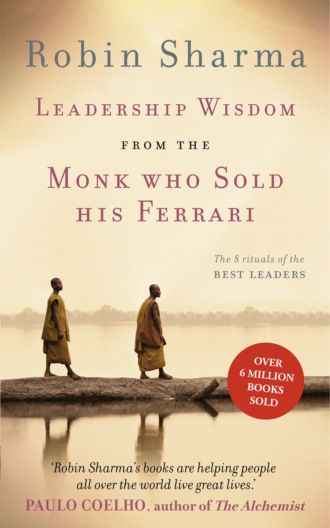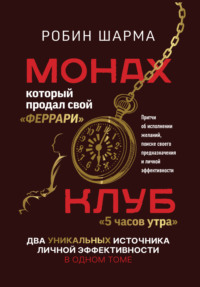
Полная версия
Leadership Wisdom from the Monk Who Sold His Ferrari: The 8 Rituals of the Best Leaders

Robin Sharma
LEADERSHIP WISDOM
FROM THE
MONK WHO SOLD
HIS FERRARI
The 8 Rituals of the BEST LEADERS

PRAISE FOR ROBIN SHARMA AND
The Monk Who Sold His Ferrari
‘Robin Sharma’s books are helping people all over the world live great lives.’ – Paulo Coelho, #1 bestselling author of The Alchemist
‘Robin Sharma has the rare gift of writing books that are truly life-changing.’ – Richard Carlson, Ph.D., author of the #1 New York Times bestseller Don’t Sweat the Small Stuff
‘Nothing less than sensational. This book will bless your life.’ – Mark Victor Hansen, co-author, Chicken Soup for the Soul
‘A great book, from an inspirational point of view.’ – Carlos Delgado, Major League baseball superstar
‘This is a fun, fascinating, fanciful adventure into the realms of personal development, personal effectiveness and individual happiness. It contains treasures of wisdom that can enrich and enhance the life of every single person.’ – Brian Tracy, author of Maximum Achievement
‘Robin S. Sharma has an important message for all of us – one that can change our lives. He’s written a one-of-a-kind handbook for personal fulfillment in a hectic age.’ – Scott DeGarmo, past publisher, Success Magazine
‘The book is about finding out what is truly important to your real spiritual self, rather than being inundated with material possessions.’ – Michelle Yeoh, lead actress of Crouching Tiger, Hidden Dragon, in TIME Magazine
‘Robin Sharma has created an enchanting tale that incorporates the classic tools of transformation into a simple philosophy of living. A delightful book that will change your life.’ – Elaine St. James, author of Simplify Your Life and Inner Simplicity
‘Sheds light on life’s big questions.’ – The Edmonton Journal
‘The Monk Who Sold His Ferrari is coherent, useful and definitely worth reading ... It can truly help readers cope with the rat race.’ - The Kingston Whig-Standard
‘Simple wisdom that anyone can benefit from.’ – The Calgary Herald
‘This book could be classified as The Wealthy Barber of personal development ... [It contains] insightful messages on the key concepts which help bring greater balance, control and effectiveness in our daily lives.’ – Investment Executive
‘A treasure – an elegant and powerful formula for true success and happiness. Robin S. Sharma has captured the wisdom of the ages and made it relevant for these turbulent times. I couldn’t put it down.’ – Joe Tye, author of Never Fear, Never Quit
‘Simple rules for reaching one’s potential.’ – The Halifax Daily News
‘Sharma guides readers toward enlightenment.’ – The Chronicle-Herald
‘A wonderfully crafted parable revealing a set of simple yet surprisingly potent ideas for improving the quality of anyone’s life. I’m recommending this gem of a book to all of my clients.’ – George Williams, president, Karat Consulting International
‘Robin Sharma offers personal fulfillment along the spiritual highroad.’ – Ottawa Citizen
PRAISE FOR
Leadership Wisdom from The Monk Who Sold His Ferrari
‘One of the year’s best business books.’ – PROFIT Magazine
‘Very informative, easy to read and extremely helpful ... We have distributed copies to all our management team as well as to store operators. The feedback has been very positive.’ – David Bloom, CEO, Shoppers Drug Mart
‘Robin Sharma has a neat, down-to-earth way of expressing his powerful solutions for today’s most pressing leadership issues. This is so refreshing in a period when businesspeople are faced with so much jargon.’ – Ian Turner, manager, Celestica Learning Centre
‘This book is a gold mine of wisdom and common sense.’ – Dean Larry Tapp, Richard Ivey School of Business, University of Western Ontario
‘A terrific book that will help any businessperson lead and live more effectively.’ – Jim O’Neill, director of operations, District Sales Division, London Life
‘Sharma’s mission is to provide the reader with the insight to become a visionary leader, helping them transform their business into an organization that thrives in this era of change.’ – Sales Promotion Magazine
ALSO BY ROBIN SHARMA
The Monk Who Sold His Ferrari
Discover Your Destiny with The Monk Who Sold His Ferrari
The Secret Letters of The Monk Who Sold His Ferrari
Life Lessons from The Monk Who Sold His Ferrari
Family Wisdom from The Monk Who Sold His Ferrari
The Greatness Guide
Be Extraordinary: The Greatness Guide, Book 2
MegaLiving
The Leader Who Had No Title
The Saint, The Surfer and The CEO
To my daughter, Bianca. May you always be the model of joy.
To the many readers of The Monk Who Sold His Ferrari who took the time out of their busy lives to tell me how this simple book touched them. You have moved me.
And to all those leaders who deeply honor the sacred trust between them and the people they have the privilege to lead. Keep blessing lives and liberating talent.
This is the true joy in life, being used for a purpose recognized by yourself as a mighty one, being a true force of Nature instead of a feverish little clod of ailments and grievances complaining that the world will not devote itself to making you happy. . . . I want to be thoroughly used up when I die. For the harder I work, the more I live. I rejoice in life for its own sake. Life is no brief candle to me. It’s a sort of splendid torch which I’ve got to hold up for the moment and I want to make it burn as brightly as possible before handing it on to future generations.
George Bernard Shaw
Table of Contents
Cover
Title Page
Praise
Also by Robin Sharma
Dedication
Epigraph
CHAPTER ONE A Wild Ride to Success
CHAPTER TWO A Monk in My Rose Garden
CHAPTER THREE The Miraculous Transformation of a Corporate Warrior
CHAPTER FOUR The Wisdom of Leadership Vision
RITUAL 1 Link Paycheck to Purpose
CHAPTER FIVE The Ritual of a Compelling Future Focus
RITUAL 2 Manage by Mind, Lead by Heart
CHAPTER SIX The Ritual of Human Relations
RITUAL 3 Reward Routinely, Recognize Relentlessly
CHAPTER SEVEN The Ritual of Team Unity
RITUAL 4 Surrender to Change
CHAPTER EIGHT The Ritual of Adaptability and Change Management
RITUAL 5 Focus on the Worthy
CHAPTER NINE The Ritual of Personal Effectiveness
RITUAL 6 Leader Lead Thyself
CHAPTER TEN The Ritual of Self-Leadership
RITUAL 7 See What All See, Think What None Think
CHAPTER ELEVEN The Ritual of Creativity and Innovation
RITUAL 8 Link Leadership to Legacy
CHAPTER TWELVE The Ritual of Contribution and Significance
RESOURCES FOR LEADERSHIP AND PERSONAL EXCELLENCE
Acknowledgments
About the Author
Exclusive Sample Chapter
Back Ads
Copyright
About the Publisher
CHAPTER ONE A Wild Ride to Success
It was the saddest day of my life. As I arrived at work after a rare long weekend spent hiking and laughing in the mountains with my kids, I saw two enormous security guards hunched over the mahogany desk in my coveted corner office. Running closer, I could see that they were rifling through my files and peeking into the precious documents on my laptop computer, oblivious to the fact that I had spotted them. Finally, one of them noticed me standing there, my face flushed with anger, my hands shaking at the sight of this unforgivable invasion. With an expression that revealed not a hint of emotion, he looked at me and spoke fifteen words that left me feeling as if I’d just been kicked in the chest, “Mr. Franklin, you have been fired. We must escort you out of the building immediately.”
With that simple dispatch, I went from being the senior vice-president of the fastest-growing software company on the continent to a man without a future. And believe me, I took my dismissal very hard. Failure was a foreign concept to me, an experience I had no idea how to manage. In college, I’d been a golden boy, the kid with the perfect grades, the beautiful girls and the boundless future. I made the varsity track team, was elected class president and even found the time to host a hugely popular jazz show on our campus radio station. It seemed to all concerned I was gifted and destined for great success. One day I’d overheard one of my old professors saying to a colleague, “If I had the chance to live my life over again, I’d like to come back as Peter Franklin.”
Mind you, my talents were not as natural as everyone believed. The true source of my achievements could be traced back to a punishing work ethic and an almost obsessive desire to win. My father had come to this country as a penniless immigrant many years ago with a deeply held vision of a more tranquil, prosperous and happy life for his young family. He changed our family name, settled us into a threeroom apartment in the honest part of town and started working tirelessly as a factory worker for minimum wage, a job he would keep for the next forty years of his life. And though he had no formal education, I’d never met a wiser man—until recently, when I met a most extraordinary human being, a person who you truly must get to know. I promise to tell you more about him shortly. You will never be the same.
My father’s dream for me was a simple one: get a first-class education at a first-class school. A career of peak achievement and just compensation would then be assured, or so he thought. His firm belief was that a well-developed base of personal knowledge laid the foundation for a successful life. “No matter whatever happens to you, Peter, no one will ever be able to take away your education. Knowledge will always be your best friend, no matter where you go or what you do,” he would often say to me while finishing his supper after another grueling fourteen-hour day at the factory he devoted most of his life to. My father was quite a man.
He was also a great storyteller, one of the best. In his home country, the elders used parables to convey the wisdom of the ages to their children, so he carried this rich tradition with him to his adopted country. From the day that my mother died suddenly while making his lunch in our well-worn kitchen until the time that my brother and I entered our teenage years, my father would send us off to a dreamy sleep with a delightful story that always had a life lesson. One that particularly stands out in my mind is about an old farmer on his deathbed, who asked his three sons to gather around him. “Sons,” he said, “Death is close by and I shall soon take my last breath. But before I do, I must share a secret with you. In that field behind our farmhouse, there lies a glorious treasure. Dig deep and you shall find it. You will never have to worry about money again.”
Once the old man had died, the sons ran out to the field and started digging with wild abandon. They dug for many hours and continued for many days. No part of the field was left untilled as they put every ounce of their youthful energy into this task. But, alas, no treasure could be found. Eventually, they gave up, cursing their father for his apparent deception and wondering why he would choose to make such fools of them. However, the following fall, that same field yielded a harvest the likes of which the entire community had never seen before. The three sons quickly became rich. And they never worried about money again.
So, from my father, I learned the power of dedication, diligence and hard work. In my college days, I toiled day and night, eager to stay on the Dean’s List and to fulfill the dreams my dad had set for me. I won scholarship after scholarship and diligently sent my aging father a small check at the end of every month, a portion of the salary I received from the part-time job that I held. This was a simple token of thanks for all he had done. When it came time to enter the work force, I had already been offered a lucrative management position in the high-tech field, the field of my choice. The company was called Digitech Software Strategies and it was the place where everyone wanted to work.
Astonishingly successful, the pundits predicted its meteoric growth would only continue and I felt truly honored that the firm had actively recruited me to become a member of its high-flying team. Quickly accepting the post, I began working eighty-hour weeks to prove that I was worth every penny of the lofty salary I received. Little did I know that, seven years later, the very same company would humiliate me as I had never been humiliated before.
The first few years at Digitech were good ones. They really were. I made some fine friends, learned a great deal and quickly rose through the executive ranks. I became the acknowledged superstar, a young man who had a razor-sharp mind, who knew how to work hard and who showed true commitment to the company. Though I’d never really been taught how to manage and lead people, they just kept on promoting me to ever-higher positions of responsibility.
But, without a doubt, the best thing that happened to me at Digitech Software Strategies was meeting Samantha, the woman who would eventually become my wife. A bright young manager herself, she was strikingly pretty, with a formidable intellect to match. After meeting at the Christmas party, we quickly hit it off and were soon spending what little free time we had together. From day one, Samantha was my greatest fan, a true believer in my potential and talent. “Peter, you’ll be the CEO,” she would regularly tell me, giving me a soft smile. “I know you’ve got what it takes.” Unfortunately, not everyone felt the same way. Or perhaps they did.
The CEO of Digitech Software ruled the company like a dictator. A self-made man with a vicious streak, he had an ego that matched his grossly inflated paycheck. When I first started working with him, he was polite though reserved. But when word started to spread about my abilities and my ambitions, he grew cold, often communicating with me through terse memos when the situation called for something less formal. Samantha called him an “insecure little clod of a man,” but the fact remained that he had power. Real power. Maybe he felt that as I rose to higher management positions, I would make him look bad. Or maybe he saw too much of himself in me—and didn’t like what he saw.
I have to admit, however, that I carried my own weaknesses. Foremost was a hair-trigger temper. If something went wrong at the wrong time, a rage brewed within me that I simply could not control. I have no idea where it came from, but it was there. And it was not a business asset. I’ll also admit that though I think I’m a fundamentally decent person, I could be a little rough around the edges when it came to the art of managing people. Like I said, I had never received any leadership training and operated on what little instinct I had been granted. I often felt that not everyone on my team shared my work ethic and commitment to excellence, which led me to frustration. Yes, I would yell at people. Yes, I took on far more responsibility than I was capable of handling. Yes, I should have spent more time building relationships and cultivating loyalty. But there were always too many fires to put out and I never seemed to have enough time to attend to the things that needed improving. I guess I was like the mariner who spent all his time bailing water out of his boat rather than taking the time to fix the hole in it. Shortsighted at best.
And so the day came when I was fired. The months that followed were truly the darkest of my life. Thank God I had Samantha and the kids around me. They did their best to lift my spirits and encourage me to pick up the pieces of my once fast-tracked career. But those months of idleness showed me that our self-esteem is linked to our jobs. At a cocktail party, the first question we are inevitably asked is, “So what do you do for a living?” As we began our weekly round of golf, my partners would always ask, “Any news on work, Peter?” The doorman at our luxury high rise, always a master of small talk, would regularly inquire whether things were going well at the office. With no job to go to, I no longer had any answers.
I went from getting up in the morning and rushing off to the subway station, my mind full of ideas, to awakening around noon in a darkened room, littered with empty Heineken bottles, Marlboro packages and sticky Häagen-Dazs containers. I stopped reading the Wall Street Journal and retreated into cheesy spy novels, old western paperbacks and trashy tabloids that revealed Oprah was an alien and that Elvis was still alive, managing a McDonald’s on the West Coast. I could not face reality. I just didn’t want to think too hard or do too much. A numbing pain pervaded my body and resting under the covers of our four-poster bed seemed like the best place to be.
Then one day, I received a phone call. It was an old college friend who had carved out an excellent reputation as one of the best minds in the software industry. He told me that he had just quit his job as chief programmer for a large company and was getting ready to start his own firm. I still recall him telling me he had what he called “a brilliant concept” for a new line of software and needed a partner he could trust. I was his first choice. “It’s a chance to build something great, Peter,” he said with his usual sense of enthusiasm. “C’mon. It’ll be fun.”
Part of me lacked the confidence to say yes. Starting a new business is never easy, especially in the high-tech field. What if we failed? As it was, our financial situation was a mess. As senior vice-president at Digitech Software, I was paid well and lived the kind of life that my father could only have dreamed of. I drove a brand-new BMW while Samantha had her own Mercedes. The kids went to private school and spent summers at a prestigious sailing camp. My golf club’s membership fees alone totalled the annual income of many of my friends. Now, with no job, the unpaid bills were piling up and many promises were being broken. It was not the ideal time to dream of my own business.
On the other hand, my wise father always told me that “nothing can defeat you unless you defeat yourself.” I needed this opportunity to lift me from the darkness that had enveloped my life. I needed a reason to wake up in the morning. I needed to reconnect to that sense of passion and purpose I had felt in college when I believed that I was unstoppable and the world was truly a place of unlimited possibilities. I had enough intuition to know that life sends us gifts from time to time. Success comes to those who recognize and accept them. So I said yes.
We grandly named the company GlobalView Software Solutions and set up shop in a tiny office in a run-down industrial complex. I was CEO and my partner was the self-appointed chairman. We had no employees, no furniture and no money. But we did have a great idea. And so we started pitching our software concept to the marketplace. Fortunately, the marketplace enthusiastically responded. Soon Samantha came to work with us and we hired other employees. Our innovative software products began to sell at a phenomenal pace and our profits quickly soared. That first year of operation, Business Success magazine listed us as one of the country’s fastest-growing companies. My father was so proud. Though he was eighty-six at the time, I still remember him carrying a huge basket of fruit into the office to celebrate our achievement. Tears streamed down his face when he looked at me and said, “Son, your mother would have been very happy today.”
That was more than eleven years ago and we have continued our blistering pace of growth. GlobalView Software Solutions is now a two-billion-dollar company with 2,500 employees at eight locations around the world. Just last year we moved into our new international headquarters, a world-class complex complete with a state-of-the-art manufacturing facility, three Olympic-sized swimming pools and an amphitheater for meetings and other corporate events. My partner is no longer involved in the day-to-day operations of the company and spends most of his time on his private island in the Caribbean or mountain-climbing in Nepal. Samantha left the leadership of the company a few years ago to pursue her passion for writing and to become more involved in community service. As for me, I’m still the CEO, but now I have crushing responsibilities that consume the majority of my time. Twenty-five hundred people look to me for their livelihoods and many thousands more depend on our organization to provide products and services that help them in their daily lives.
Sadly, my father died two years after the company was formed, and though he always sensed I would be enormously successful, I don’t think that even he could have imagined that we would be where we are today. I do miss him but, with all that’s on my plate, I have little time to reflect on the past. I still work hard, about eighty hours on a good week. I haven’t taken a real vacation in years and I’m as hard-driving, ambitious and competitive as I was the day I started work as a twenty-three-year-old kid at Digitech Software Strategies. Until I had the good fortune to meet a very special teacher a relatively short while ago, I still tried to do too much and micromanage every aspect of the business. I knew this was a weakness, but I seemed to have succeeded in spite of it.
Until that most memorable meeting, which I am about tell you about in greater detail, I still had my bad temper, a characteristic that had only worsened as the pressures on me had grown along with my business. And, despite the passage of time, I still had a hard time managing and motivating people. Oh sure, my employees listened to me. But it was not because they wanted to—it’s because they had to. They had no loyalty to me and no real commitment to the company. Fear rather than respect seemed to be the reason they would carry out the commands I issued from my palatial executive suite. It seemed all my power stemmed solely from my position. And I knew that was a bad position to be in.
Let me share a little more with you about the challenges I faced as the leader of a fast-growing company in these turbulent and change-crazed times. Despite the expansion of our business, morale had plummeted. I had heard through the grapevine that some people were saying we had grown too quickly and that profits had become more important than people. Others complained that they were being forced to work too hard with not enough resources to support them. Still others complained that the tremendous change they faced on a daily basis, ranging from innovations in technology to new structures within the bureaucracy, left their heads spinning and their bodies tingling with stress. There was little trust, low productivity and even less creativity. And from what I could gather, nearly everyone in the organization believed that the blame for the problems rested squarely with one person: me. The consensus was that I just did not know how to lead.








